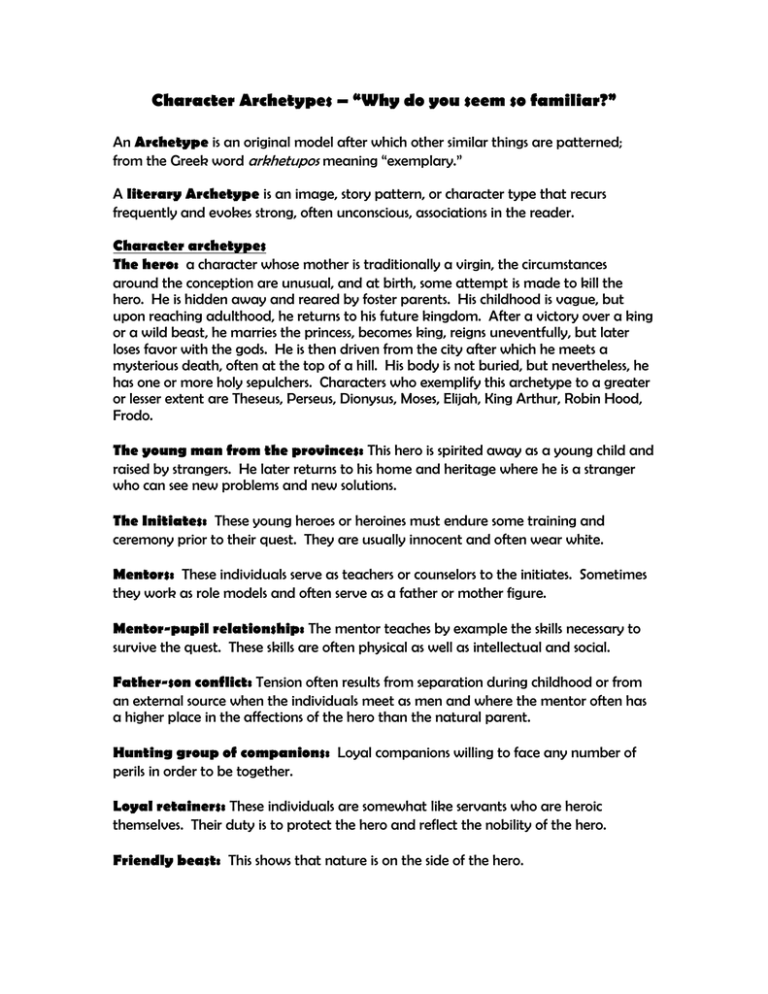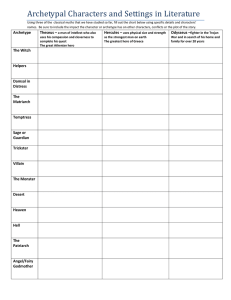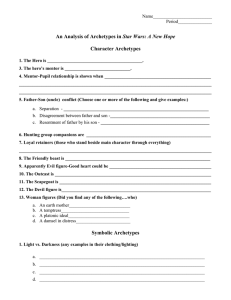Character Archetypes – “Why do you seem so familiar?”
advertisement

Character Archetypes – “Why do you seem so familiar?” An Archetype is an original model after which other similar things are patterned; from the Greek word arkhetupos meaning “exemplary.” A literary Archetype is an image, story pattern, or character type that recurs frequently and evokes strong, often unconscious, associations in the reader. Character archetypes The hero: a character whose mother is traditionally a virgin, the circumstances around the conception are unusual, and at birth, some attempt is made to kill the hero. He is hidden away and reared by foster parents. His childhood is vague, but upon reaching adulthood, he returns to his future kingdom. After a victory over a king or a wild beast, he marries the princess, becomes king, reigns uneventfully, but later loses favor with the gods. He is then driven from the city after which he meets a mysterious death, often at the top of a hill. His body is not buried, but nevertheless, he has one or more holy sepulchers. Characters who exemplify this archetype to a greater or lesser extent are Theseus, Perseus, Dionysus, Moses, Elijah, King Arthur, Robin Hood, Frodo. The young man from the provinces: This hero is spirited away as a young child and raised by strangers. He later returns to his home and heritage where he is a stranger who can see new problems and new solutions. The Initiates: These young heroes or heroines must endure some training and ceremony prior to their quest. They are usually innocent and often wear white. Mentors: These individuals serve as teachers or counselors to the initiates. Sometimes they work as role models and often serve as a father or mother figure. Mentor-pupil relationship: The mentor teaches by example the skills necessary to survive the quest. These skills are often physical as well as intellectual and social. Father-son conflict: Tension often results from separation during childhood or from an external source when the individuals meet as men and where the mentor often has a higher place in the affections of the hero than the natural parent. Hunting group of companions: Loyal companions willing to face any number of perils in order to be together. Loyal retainers: These individuals are somewhat like servants who are heroic themselves. Their duty is to protect the hero and reflect the nobility of the hero. Friendly beast: This shows that nature is on the side of the hero. The Devil Figure: Evil incarnate! This character offers worldly goods, fame, or knowledge to the hero in exchange for possession of the soul. The Creature of nightmare: a monster usually summoned from the deepest, darkest part of the human psyche to threaten the lives of the hero/heroine. Often it is a perversion or desecration of the human body. The Evil Figure with the Ultimately good heart: A redeemable devil figure saved by the nobility or love of the hero. The Scapegoat: An animal or more usually a human whose death in a public ceremony expiates some taint or sin that has been visited upon a community. Their death often makes them a more powerful force in the society than when they lived. The Outcast: A figure who is banished from a social group for some crime (real or imagined) against his fellow man. The Outcast is usually destined to become a wanderer from place to place. The star-crossed Lovers: These two characters are engaged in a love affair that is fated to end tragically for one or both due to the disapproval of society, friends, or family or some tragic situation. The WOMAN figure: The Earth mother: Symbolic of fruition, abundance, and fertility, this character traditionally offers spiritual and emotional nourishment to those with whom she comes in contact. Often she dresses in earth colors and is a “robust” woman clearly capable of bearing children. The Temptress: Characterized by sensuous beauty, this woman is one to whom the protagonist is physically attracted and who ultimately brings about his downfall, or at least presents a formidable obstacle in reaching his goal. The Platonic Ideal: This woman is a source of inspiration and a spiritual ideal. The protagonist or author has an intellectual rather than a physical attraction to this woman or girl. The Unfaithful Wife: A woman married to a man she sees as dull or distant and is attracted to a more virile or interesting man. The Damsel in Distress: The vulnerable woman who must be rescued by the hero. She often is used as a trap to ensnare the unsuspecting hero.



